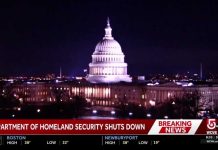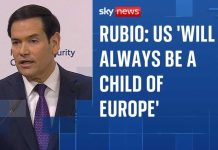
Russia’s decision to blacklist the British Council as an “undesirable organization” marks a severe diplomatic blow as Moscow openly labels the UK an “instigator of wars” and architect of global crises.
Key Takeaways
- Russia has designated the British Council as an “undesirable organization,” effectively banning its operations in the country
- Moscow accused London of being the “architect of global crises” and an “instigator of wars” in an extraordinarily direct diplomatic attack
- The Russian Prosecutor General claims the British Council promotes “LGBT movement” ideologies, which are outlawed in Russia
- This ban follows years of deteriorating UK-Russia relations, worsened by espionage scandals and the Ukraine conflict
- Anyone continuing to associate with the British Council in Russia could face severe legal penalties under Russia’s “undesirable” organization laws
Moscow Targets British Cultural Institution
In a significant escalation of diplomatic tensions, Russia has officially blacklisted the British Council, designating it an “undesirable organization” and effectively terminating its operations within Russian territory. The decision comes amid increasingly hostile rhetoric from Moscow toward London, with Russian authorities making the extraordinary claim that the United Kingdom serves as an architect of global instability. The Russian Prosecutor General’s office has accused the British Council of covertly advancing British interests under the guise of cultural and educational programs while promoting ideologies that conflict with Russian values.
“Russia on Thursday designated the British Council as an undesirable organization, as Moscow labeled London the architect of global crises and instigator of wars,” stated State media.
Accusations of Foreign Interference and “LGBT Promotion”
The Russian authorities have leveled serious accusations against the British Council, claiming it works to “discredit” both Russia’s domestic and foreign policies. According to Russian prosecutors, the Council actively supports the “LGBT movement,” which is strictly outlawed under Russian legislation that prohibits what officials term “LGBT propaganda.” This accusation reflects the wider context of President Putin’s administration increasingly positioning itself as a defender of “traditional values” against what it characterizes as Western moral decay and cultural imperialism, a stance that resonates with conservative Russians who support the government’s hardline approach.
“London organizes coups, weakens not only its geopolitical enemies but also its closest allies, pits nations against each other and prevents the resolution of bloody conflicts that it unleashed,” stated FSB.
Deteriorating UK-Russia Relations
Relations between Russia and the United Kingdom have been steadily deteriorating for years, with multiple espionage scandals and geopolitical conflicts driving a deepening wedge between the two nations. The 2018 poisoning of former Russian spy Sergei Skripal and his daughter in Salisbury, England, marked a particular low point, with Britain accusing the Russian state of orchestrating a chemical weapon attack on its soil. Since Russia’s invasion of Ukraine in 2022, tensions have reached new heights as the UK emerged as one of Ukraine’s most vocal and active supporters, providing substantial military aid and taking a leading role in international sanctions against Moscow.
Legal Consequences and Broader Crackdown
The designation of the British Council as an “undesirable organization” carries severe legal implications for anyone associated with it in Russia. Under Russian law, individuals or entities continuing to work with or support “undesirable” organizations face substantial fines and potential imprisonment. This move against the British Council aligns with a broader pattern of increasing restrictions on foreign institutions operating in Russia, particularly those perceived as advancing Western influence. The Kremlin has systematically labeled dozens of Western-backed organizations as “undesirable,” effectively criminalizing their activities within Russian borders.
Implications for Cultural Exchange
The British Council has historically served as a vital conduit for cultural exchange between Russia and the United Kingdom, offering language courses, educational programs, and cultural events designed to build understanding between the two societies. Its banning represents a significant loss for ordinary Russians seeking international educational opportunities and cultural connections with the UK. The Council’s closure adds to the growing isolation of Russian society from Western influences, a trend that has accelerated dramatically since the Ukraine conflict began and which aligns with President Putin’s vision of Russia as a distinct civilization separate from what he portrays as a morally compromised West.




